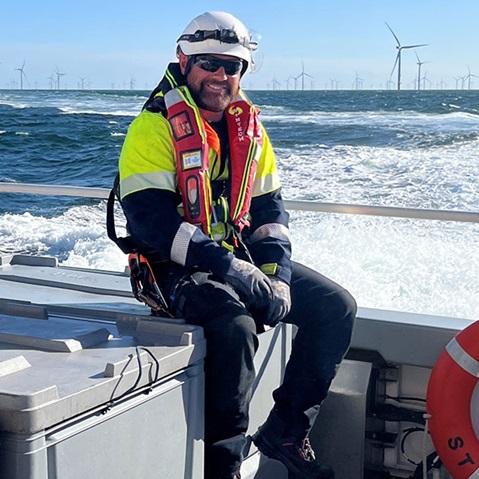



As part of National Apprenticeship Week, we spoke with Stewart Harris who this month completed the first year of his three-year apprenticeship here at RWE.
Following a distinguished career in the Army, Stewart is now an HSE Development and Construction Apprentice. Here, he shares his insight into his new Monday to Friday and offers advice for those looking to break into the renewables industry.
I was in the Welsh Guards (an infantry regiment in the British Army) for 13 years and did tours in Bosnia, Kosovo, Northern Ireland, Iraq and Afghanistan. After being badly injured and eventually discharged, I took up project management work but decided to retrain during the pandemic.
I completed my Global Wind Organisation certificate and found myself working two weeks on and two weeks off on offshore wind turbines in the North Sea, off the coast of Holland and Belgium.
After a while, I decided to find something more permanent, but still within the sustainability sector. I sent out countless applications and fell into contact with Marcus Peters, Head of HSE offshore, who supported me with my CV and eventually offered me a place on RWE’s Health, Safety and Environment apprenticeship scheme.
I started last March, and my feet haven't touched the ground since. I've been learning everything within HSE, focusing on development and construction. It’s a world apart from what I was doing as a technician, and even further from my life in the Army.
I’ve just finished my English qualification and my National General Certificate in Occupational Health and Safety, and each month I provide in-depth essays on everything I’ve learned.
The number one skill? Resilience. On the battlefield, things can change rapidly – calm one minute, rough the next – you must be durable and flexible in strength and mind. But resilience is in everyone, not just those in the military.
Day-to-day, the skills I learnt taking my ELCAS (Enhanced Learning Credits Administration Services) have been invaluable to getting me where I am today. My basic safety training, basic technical training, and knowing how motorised transport and engines work enabled me to work on turbines, and I still use those skills today.
I talk at length with other men and women from my infantry background and becoming a technician seems to be the go-to for those from the Navy, Royal Air Force and the Army. However, there aren’t many infantry soldiers because you don't tend to get many qualifications, especially in engineering.
If you’re from a Royal Electrical Mechanical Engineers or Royal Engineers background, you have a fantastic head start. My advice to the men and women leaving the military is to get your hands around mechanical equipment.
I recommend speaking with the motorised transport sections of your parent units and getting amongst the cars and learning about the engines. These skills will be crucial if you want to pursue a technical career offshore or onshore in the renewable energy sector.
For those that don’t wish to be at sea, or on the top of turbines, there are so many roles to choose from supporting offshore wind. Such as HSE, Stakeholders, Warehouse managers or even an environmental affairs advisor. Research what qualifications would be needed for you desired role, and go and see you education officer on camp. You never know, the course might me part funded or even free.
At RWE, we have a fantastic apprenticeship programme and I’d like to take this as far as I can for many years, learning everything from the ground up. I'm loving where I am in the HSE world - continuing to keep our industry the safest out there.
It looks like I might be going on to focus on the special operations side of things, which involves jackups - the ships that go out into the sea with legs that go down and fix into the seabed, enabling it to raise out of the water to build wind turbines effectively.
In the future, I'd love to be part of raising awareness of our apprenticeship scheme more broadly – particular with younger people. Offshore wind has so many exciting opportunities for ex-Armed Forces – it’s a rapidly evolving industry where those transitioning to civilian life can really make the most of their skills, but more needs to be done to ensure these opportunities are fully realised.

